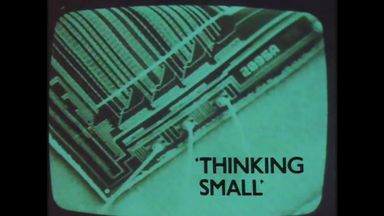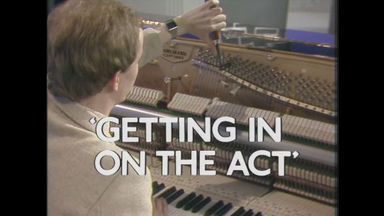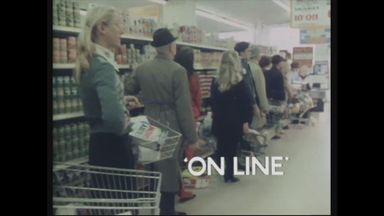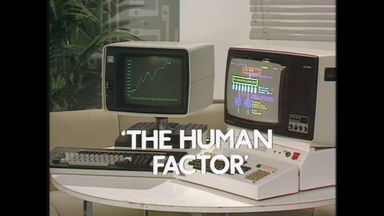Managing the Micro
4. On Line
Clips from this programme
A "Not the Nine o Clock News" supermarket checkout sketch
Duration: 00:30Brian Redhead explains how the new supermarket barcodes work using a library book scanning system
Duration: 02:13A traditional paper-driven supermarket stock management and sales system is compared with the revolutionary new methods using barcodes being introduced by Tescos and Key Markets.
Duration: 05:54Discussion of the inevitable human consequences of introducing the new technology in supermarkets - with John Flood, the deputy general secretary of USDAW and Donald Harris, a director of Tescos
Duration: 05:53A networked production system being introduced at British Leyland's Land Rover plant at Solihull. The system monitors people and parts to optimise production.
Duration: 06:02British Leyland and Unipart use Prestel and voice activated stock control enquiry system to help its dealers find new cars or spare parts.
Duration: 04:41Predictions by USDAW that by 1982/83 these new systems will be widespread and will even include electronic funds transfer within the banking system.
Duration: 01:12Managing the Micro
1. Thinking Small
First broadcast: 17th May 1981
Duration 24:46
BRIAN REDHEAD examines some of the implications of the new technological revolution for people in industry today. 1: Thinking Small: 'Software control' is said to be the key to the importance of 'the micro'. But what does that mean? And how is microelectronics helping small companies to stay competitive at a difficult time? Film editor M. A. C. ADAMS Producer DAVID ALLEN
2. Getting in on the Act
First broadcast: 24th May 1981
Duration 24:23
BRIAN REDHEAD examines some of the implications of the new technological revolution in industry. 2:Getting in on the Act: It is said that companies must 'think micro' because if they don't others will. But how can a micro be introduced into a new product? And how much risk is there? An electronic piano tuner, a greenhouse controller, a tape measure and a digital read-out for machine tools help show what is involved. Film editor U. A. C. ADAMS Producer DAVID ALLEN
3. Towards the Last Frontier
First broadcast: 31st May 1981
Duration 24:35
BRIAN REDHEAD examines some of the implications of the new technological revolution for people in industry today.3: Towards the Last Frontier: Britain's industrial survival may depend on the readiness of companies to adopt flexible, computer-based manfacturing methods. But flexibility is not just a matter of equipment. It's also a question of attitudes and the ability to come to terms with the human effects of change. Director: DAVID SCOTT COWAN Producer: DAVID ALLEN
4. On Line
First broadcast: 7th June 1981
Duration 24:30
BRIAN REDHEAD examines some of the implications of the new technological revolution for people in industry today. 4: On Line: Laser supermarket check-outs, new time clocks at British Leyland, and Viewdata terminals in the local garage are only the tips of a number of electronic icebergs-networks of information links which are beginning, for good or ill, to have a far-reaching effect on the high street and on white-collar jobs in industry. Director DAVID SCOTT COWAN Producer DAVID ALLEN
Now playing
5. The Human Factor
First broadcast: 14th June 1981
Duration 24:27
BRIAN REDHEAD examines some of the implications of the new technological revolution. 5: The Human Factor: The office is ripe for major changes and there have already been disputes over the introduction of new equipment such as word processors. How do people react to the micro? Is the spread of the new technology inevitable? Director DAVID SCOTT COWAN Producer DAVID ALLEN













